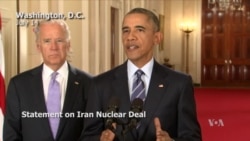Months of international negotiations and years of sanctions targeting Iran’s nuclear program led up to this one moment. In the early hours of July 14, U.S. President Barack Obama made his way down a long red-carpeted hallway in the White House to announce a historic agreement.
“The United States, together with our international partners, has achieved something that decades of animosity has not – a comprehensive long-term deal with Iran that will prevent it from obtaining a nuclear weapon,” Obama said.
The American leader, flanked by Vice President Joe Biden, spoke for 14 minutes in a televised statement where he hailed the Iran nuclear agreement as an example of how American diplomacy can bring about change that will make the “volatile” Middle East, and hence the world, more safe and secure.
“Today because America negotiated from position of strength and principal, we have stopped the spread of nuclear weapons in this region,” Obama said.
Agreement details
Key Points of Iran Nuclear Accord
Key Points of the Iran Nuclear Deal
- Iran will reduce stockpile of low-enriched uranium by 98 percent to 300 kg for 15 years
- Iran will reduce by two-thirds the number of centrifuges operating to enrich uranium at its main processing center
- Iran is prevented from designing warheads or conducting experiments on nuclear weapons-related technology.
- Arms embargo on Iran will be eased, as long as IAEA judges Iran's nuclear program to be peaceful.
- International sanctions on Iran will be lifted, enabling it to export oil.
- If an international panel finds Iran is not honoring the accord, it can vote to restore sanctions.
President Obama laid out the key points of the deal, noting that “every pathway to a nuclear weapon is cut off.” Under the agreement, he said Iran would no longer produce highly enriched uranium and weapons-grade plutonium that are necessary to make a nuclear bomb. Iran will remove two-thirds of its installed centrifuges, and will not use its advanced centrifuges to produce enriched uranium for the next decade. Iran will also get rid of 98 percent of its stockpiled enriched uranium and modify its core reactor.
As he laid out details of the nuclear deal, President Obama made clear that the international community will be in a position to verify Iran’s compliance, noting “this deal is based not on trust, but on verification.”
The American president said United Nations inspectors would have 24-7 access to Iran’s key nuclear facilities. In exchange, Iran will receive relief from sanctions put in place by the U.S. and U.N. Security Council. President Obama said Iran must complete key steps before it begins to receive new sanctions relief, including the lifting of restrictions on arms and ballistic missiles.
“If Iran violates the deal, all the sanctions will snap back,” Obama said.
Congressional review
The president closed his remarks with a message to the U.S. Congress, which now has 60 days to review the deal, saying while he welcomes lawmakers’ scrutiny of the agreement, he will “veto any legislation that prevents successful implementation of the deal.”
President Obama said now is not the time for “politics and posturing” and warned that an Iran armed with a nuclear weapon would be far more destabilizing to the Middle East and the world.
“History shows that America must lead not just with our might, but with our principals. It shows we are stronger not when we are alone but when we bring the world together,” Obama said. “Today’s announcement marks one more chapter in this pursuit of a safer, and more helpful, more hopeful world.”





